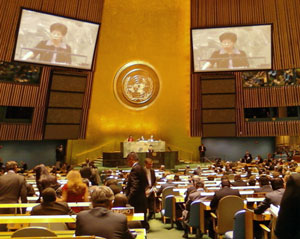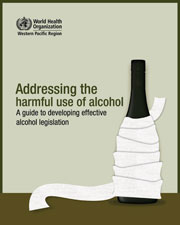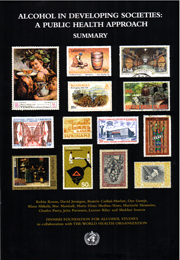
UN adopts declaration on non-communicable diseases
The United Nations High Level Meeting on the Prevention and Control of Non-communicable Diseases in New York recently adopted a Political Declaration calling for greater measures at global, regional and national levels to prevent and control NCDs.

34 Heads of State were present for the high level meeting in which 133 Member States made statements. The numbers of statements exceeded expectations and the hours of the meeting had to be extended. There was also great interest in the meeting from civil society and the corporate sector. Over 200 participants representing these sectors were admitted to the meetings of the General Assembly, the round table discussions and the more than 40 side events organized during the two days.
Conflict of interest
The Political Declaration adopted by the High Level Meeting had been negotiated during the preceding weeks and months in what was sometimes referred to as difficult negotiations. The Washington Post, reporting from the meeting, refers to this as a "fierce struggle between commercial and health interests that has only just begun". As many of the risk factors are related to commercial interest in the trade of tobacco, alcohol and unhealthy food, these sectors have strong interests in the NCD process. With the chronic nature of the diseases involved, there are also a lot at stake for pharmaceutical companies. The political declaration clearly recognizes the fundamental conflict of interest between the tobacco industry and public health. This sector was not registered for the meeting. All the other sectors were involved in the meeting.
Running up to the High Level Meeting more than 140 non-governmental organizations from around the world had signed a statement on of concern on lack of clarity on role of industry in the process. This coalition comprises civil society organisations united by the common objective of safeguarding public health policy-making against commercial conflicts of interest and they called for the development of a Code of Conduct and Ethical Framework for interactions with the private sector.
Despite the concerns of the civil society, the UN member states agreed to "acknowledge the contribution and important role played by all relevant stakeholders, including individuals, families and communities, intergovernmental organizations and religious institutions, civil society, academia, media, voluntary associations, and where and as appropriate, the private sector and industry..." The Political Declaration from the high level meeting went on to "engage the private sector and key stakeholders, where appropriate, including the private sector and civil society in collaborative partnership..."
Responding to the challenge
The High Level Meeting called for collective an multisectoral action to prevent and control the rising prevalence of NCDs. It recognized that prevention must be the cornerstone of the global response and that it is of critical importance to reduce the level of exposure of individuals and populations to the common modifiable risk factors.
The steps called for in the Political Declaration range from price and tax measures to reduce tobacco consumption to curbing the extensive marketing to children, particularly on television, of foods and beverages that are high in saturated fats, trans-fatty acids, sugars, or salt. The declaration promotes the implementation of the WHO Global strategy to reduce the harmful use of alcohol, and promotes overall healthy diets and increase physical activity. It also points to the WHO Set of recommendations on the marketing of foods and non-alcoholic beverages to children, the need to protect and support breast feeding and to develop health-promoting environments that empower people to make healthy choices.
Development issue
UN Member States in the declaration calls NCDs "one of the major challenges for development in the twenty-first century, [...] and threatens the achievement of internationally agreed development goals;" They further point out a vicious circle whereby NCDs and their risk factors worsen poverty, while poverty contributes to rising rates of NCDs. Nearly 80 percent of the pre-60 NCD deaths occurred in developing countries in 2008. The UN Member States are concerned by the growing magnitude of NCDs among people of all ages, gender, race and income levels and that poor populations and those living in vulnerable situations bear a disproportionate burden.
Unlike 10 years ago, when a similar meeting laid the foundation for an unprecedented effort to reduce the HIV/AIDS pandemic, this meeting did not raise fresh funds for NCD prevention. It points to the need to mobilize predictable and sustained financial resources and it encourages the continued inclusion of non-communicable diseases in development cooperation agendas and initiatives.
Related articles
![]()
![]()
Developed with CustomPublish CMS by Nettinfo AS




